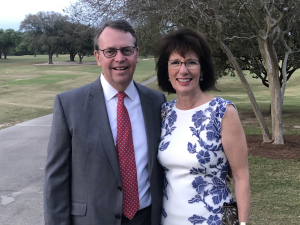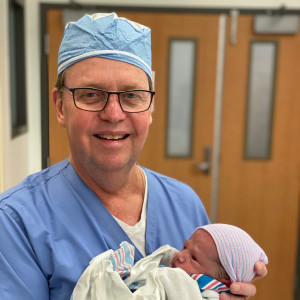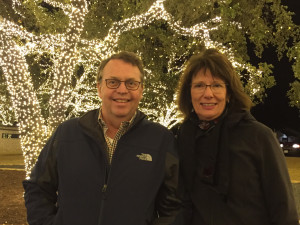"If I was having trouble with a subject [at Sewanee], it was easy to go talk to any of the professors. You didn't even have to make an appointment. You could knock on their door."

Away from parents’ watchful eyes, college students can occasionally get into shenanigans (and not the capital-S, favorite Mountain eatery type). Dr. Julius Mullins Jr., C’72, recalls joining his Sewanee suitemates on several road adventures when he was an undergraduate. “Our first year, we hitchhiked to either Cowan or Winchester to a hat factory and bought a cowboy hat,” he says. “I’d never done anything like that before. After that, we were all about hitchhiking.”
Mullins admits he didn’t mention these trips to his folks back home in Baton Rouge, Louisiana. He also didn’t share that he was using the AT&T phone card they gave him to call his now-wife, Kathy, who was a student at LSU. “I’ve saved my mother’s letters," he says, "and I remember reading one recently that said, ‘You’ve got to quit using that phone card to call Kathy. Your father wants to know why the bill is so high!’”

before retiring as an OB-GYN in 2020
For the most part, though, Mullins avoided distractions—as a biology major, he clocked long hours in the University’s Woods Laboratories. From an early age, he knew he wanted to follow his father into a medical career. The elder Mullins, who passed away in 2001, served as an OB-GYN for 50 years in Baton Rouge. Mullins Jr. retired in 2020 after nearly 40 years as an OB-GYN, working primarily at Louisiana Women’s Healthcare and Woman’s Hospital in Baton Rouge.
Aside from joining Delta Tau Delta and playing a few intramural sports, Mullins didn’t get deeply involved in co-curricular activities during his time on campus. “Mostly, I worked on keeping my grades up,” he says. “In the premed track, it was great to enjoy a class—but the really important thing was to ace tests. Average grades wouldn’t work for med school.”
Mullins says that though some courses were difficult, particularly biochemistry, his biology professors were very accessible. “If I was having trouble with a subject, it was easy to go talk to any of the professors. You really didn’t even have to make an appointment. You could knock on their door.”
One of these supportive faculty members was William Kenan Professor of Biology Harry C. Yeatman, a noted naturalist who died in 2013. In 2000 Mullins established the Yeatman Biology Research Internship Fund to assist Sewanee biology students in conducting meaningful research on and off the Mountain. “Yeatman was a very giving person,” Mullins recalls. “He would never say no to anybody for anything.” Among a lengthy list of achievements, Yeatman discovered a new species of copepod—a tiny crustacean found in most freshwater and saltwater habitats. He christened the species Asterocheres jeanyeatmanae, in honor of his wife Jean.
Mullins developed friendships with faculty in other departments too. When Kathy visited him on the Mountain during their college years, she stayed with former School of Theology instructor the Rev. Dr. Stiles Bailey Lines, C’35, and his wife Peggy. “Mrs. Lines would invite me to supper periodically, along with her nephew, who was in my class,” Mullins says. “She even cut my hair a few times.”

In part to reciprocate the generosity of Sewanee’s professors, the Mullinses recently provided a significant gift for the renovation of Woods Laboratories. “When I was a student, I used to go to Woods and study all night, instead of studying in the library,” Julius says. He notes that funds for the gift came from his sale of a PODS storage company franchise, which he acquired at the encouragement of his late friend Hunt Hearin, Jr., P’19. The Mullinses’ donation is in memory of Hearin. “My buddy Hunt was a really giving person,” Mullins says. “He would go out of his way for people who needed help.”
Mullins says Hearin stumbled into the storage business almost literally. “He was in Sarasota, Florida on business, and he was cutting across a parking lot and nearly ran into a PODS truck. Hunt was a curious sort of person, so he looked into PODS and found that they originated in Florida. He wound up calling the corporate office and buying a franchise in Baton Rouge.” With a little persuasion from Hearin, Mullins took out a loan to purchase a franchise in Richmond, Virginia. “The business did very well, and we sold it back to corporate at the end of 2021,” Mullins says. “If Hunt hadn’t introduced me to PODS, I probably wouldn’t have been able to retire from medicine as early as I did.”
Mullins notes that his two sons ran the Richmond franchise and “basically received an MBA in six months from Hunt’s guidance. I’m quite sure our close friendship and his patience with my sons made a huge difference.”
Vice President for University Relations Deborah S. Vaughn, P’20, says the Mullinses' philanthropy demonstrates the strength and scope of the Sewanee family. “Sewanee has always been a close-knit community—so, it’s wonderful but not surprising that Julius and Kathy have stayed connected to University faculty and friends through the years,” she says. “What’s truly remarkable is that they’ve chosen to honor those relationships by giving back.”
Aside from the legacy he has created through his Sewanee giving, Mullins has cemented his bond to the South Cumberland Plateau in a more serendipitous way: he appears in a photograph on display at the Cowan Railroad Museum. As local historians know, the Mountain Goat Railroad carried guests up and down the Mountain for decades before passenger service ended in 1971. Mullins was onboard for the train’s final trek.
“The last day it ran, everyone was out protesting and wanted it to remain,” he says. “We all wore black cuffs in mourning. Even the University Chaplain was there.” Mullins’ devotion to the railway was perhaps somewhat questionable. As he recalls, “I rode the train twice: once before it was discontinued and then the day it was discontinued.”

